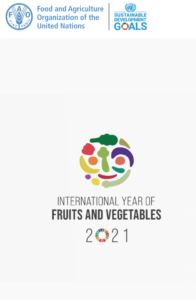- About
- Members
- Join
- Member log in
- Membership Renewal
- Member directory
- Life Members
- ASPS Life Member Professor Graham Farquhar
- ASPS Life Member Associate Professor Hendrik (Hank) Greenway
- ASPS Life Member Dr Marshall (Hal) D Hatch
- ASPS Life Member Dr Paul E Kriedmann
- ASPS Life Member Dr Mervyn Ludlow
- ASPS Life Member Emeritus Professor Rana Munns
- ASPS Life Member Conjoint Professor Christina E Offler
- ASPS Life Member Professor (Charles) Barry Osmond
- ASPS Life Member Emeritus Professor John W Patrick
- ASPS Life Member Dr Joe Wiskich
- Corresponding Members
- Elected Fellows
- Events
- Awards & Funding
- Employment
- Publications
- Research
- Teaching
- Menu
Your National Science Week event, June Phytogen and GPC e-bulletin
16 June 2021
Dear ASPS Members,
June Phytogen can be accessed HERE.
GPC May e-bulletin can be accessed HERE.
Our Society is organising activities during Science Week (14-22 August) to highlight Australian plant science. The theme of our activities is around “Plant Science Safeguarding our Future Food Security”. A series of short, fun and engaging talks and tours will be organised around the country to explain the pivotal role plant scientists and agriculturists play in feeding and clothing us all. We will present some of our research and explain how it will help meet the challenges posed by a growing world population and a changing climate. We’ll emphasise the diversity of plant science. The fact that some of us wear lab coats and rarely grow a plant in soil, while others conduct field trials or predict yields by satellite. The aim of these sessions is to explain what we do, to highlight its importance to society and hopefully to inspire more young people to consider plant science as an exciting career.
The purpose of this email is two-fold:
- to prompt members from universities not listed below to consider organising an event. Contact me for details if you’re tempted.
- to encourage ASPS members to contact the Science Week coordinators at their own university (below) and offer your assistance. Helpers and speakers do not need to be ASPS members.
Contact me if you have questions. Thanks, Peter Ryan
Once you have your National Science Week event organised please email Phytogen editor Georgia Koerber (georgia.koerber@adelaide.edu.au) with a link to your event, a picture and dates for inclusion in the July issue of Phytogen. June Phytogen can be accessed HERE.
Queensland University of Technology – Brett Williams
University of Newcastle – Joseph Pegler (hopefully)
University of Sydney (separate events at the Camperdown and Camden campuses) – Mary Byrne, Brent Kaiser, Robert Park, Marcus Heisler, Claudia Keitel
Australian National University/CSIRO Agriculture and Food – Peter Ryan, Caitlin Byrt, Uli Mathesius
La Trobe University – Kim Johnson, Janet Wheeler
University of Melbourne – Mike Haydon, Michelle Watt
Monash University – Ros Gleadow
University of Adelaide – Megan Sheldon, Beth Loveys, Georgia Koerber, Steve Tyerman, Rachel Burton
Flinders University – Kathy Soole
____________________________________
Dr Peter R Ryan
President, Australian Society of Plant Scientists
Honorary Fellow, CSIRO Agriculture and Food
PO Box 1700
Canberra ACT 2601, Australia
Email: Peter.Ryan@csiro.au
Mob: 0468671565
June 2021 Phytogen
15 June 2021
Welcome to Phytogen for June 2021. Plans are well underway for a National ASPS Hybrid meeting on Thursday and Friday 25th and 26th November 2021. More details soon. Meanwhile, in this issue:
-
Report from 2020 Jan Anderson Award joint recipient, Dr Kristine Crous, Western Sydney University.
-
National ScienceWeek 2021 – 14th-22nd August
In 2020, we had joint recipients for the Jan Anderson Award. I hope you will enjoy reading about the wonderful work by Kristine Crous from Western Sydney University.
2020 Jan Anderson Award joint recipient – Dr. Kristine Crous, Western Sydney University.
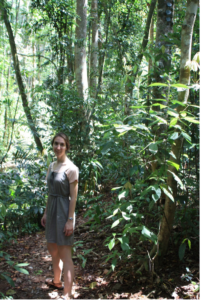
Fig.1: Kristine in tropical rainforest in Australia. |
Globally, the average temperature has increased by about 1°C since the Industrial revolution, and Australia has experienced a sustained period of warmer climate over the past 10 years including several of the hottest summers on record. While Australia is one of the drier continents in the world, there is also a lot of biodiversity with a unique set of plant and animal species. We all depend on plant species and their ecosystem services in several ways (i.e. food, clean air, ecotourism) but it is still unclear to what extent these services will change in a future warmer world. Understanding how plant function adjusts to these warmer conditions, in part caused by commensurate increases in atmospheric CO2 has been the focus of my research effort.
The Jan Anderson Award recognised the contributions that I made to understand plant responses to both elevated CO2 and climate warming, insights that contributed to several global datasets (Atkin et al., 2015; Kumarathunge et al., 2019; Smith et al., 2019) and to improve climate feedbacks represented in models (De Kauwe et al., 2013; Jiang et al., 2020).
I have conducted several experiments on Eucalyptus species to understand their physiological responses of photosynthesis (Crous et al. 2013) and respiration to climate warming (Crous et al. 2011, 2017). In an experiment using temperate and tropical provenances of two broadly distributed Eucalyptus species, I discovered that photosynthesis operates closer to the temperature optimum in tropical provenances than temperate provenances (Crous et al. 2018).
Given that there are large uncertainty regarding the temperature responses of rainforest species, I have measured the temperature response curves of photosynthesis and respiration in tropical and temperate rainforests to understand how close they are operating to their thermal optimum and how vulnerable these species are to further climate warming, as part of a DECRA award (Fig. 1).
Not only are Australian rainforests biodiverse, they have a direct link to the past, as many rainforest species have a Gondwanan lineage. So while these rainforests have seen some climate change in the past, the question is how will they cope with future climate warming?
To explore future climate conditions, my work has involved experimental set-ups such as the whole-tree chamber experiment (Fig. 2) or the Eucalyptus free-air CO2 enrichment experiments (EucFACE) (Fig. 3, 4), where elevated atmospheric CO2 or atmospheric warming treatments can be applied on large trees. Because trees have long lifespans, their ability to acclimate will likely be an important factor in determining their future.
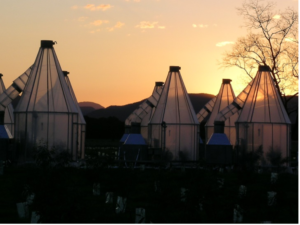 |
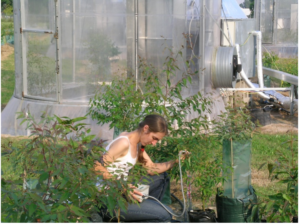 |
Fig. 2: The whole-tree chamber experiment at Western Sydney University in Richmond after completing diurnal measurements (left) and measurements on saplings outside the chambers (right).
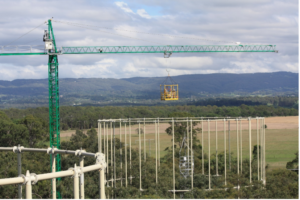
Fig. 3. Getting ready to do measurements in the Eucalyptus canopy at the EucFACE experiment at Western Sydney University (above) and measuring photosynthesis (right). |
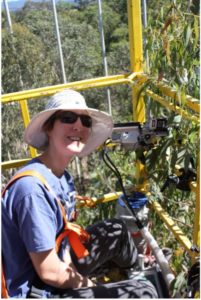 |
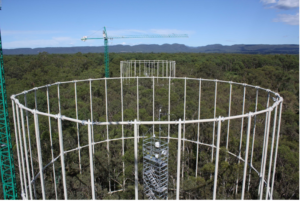
Fig. 4. EucFACE, two out of the six plots, view from above.
These large-scale experiments enable many collaborations examining different parts of an ecosystem in an attempt to understand the bigger picture including feedbacks of nutrients on the carbon cycle. While we are developing some understanding on how plants adjust to warmer temperatures, there are still many questions that are unclear, especially around temperature limits and plasticity among different plant species. Most models currently do no account for thermal acclimation of respiration and/or photosynthesis, with the risk of overestimating future responses of carbon uptake.
Recently, I have been elected as a ASPS representative for NSW in the discipline of whole plants. I hope that we can continue to link plant responses from molecular to ecosystem scales back to the whole plant and what it means for its survival, function and growth. Changes in response to biotic and abiotic factors in a plant’s environment drive natural selection which is part of how plants adapt to new conditions.
References
Atkin, O.K., Bloomfield, K.J., Reich, P.B., Tjoelker, M.G., Asner, G.P., Bonal, D., et al. (2015). Global variability in leaf respiration in relation to climate, plant functional types and leaf traits. New Phytologist 206(2), 614-636. doi: 10.1111/nph.13253.
Crous, K.Y., Drake, J.E., Aspinwall, M.J., Sharwood, R.E., Tjoelker, M.G., and Ghannoum, O. (2018). Photosynthetic capacity and leaf nitrogen decline along a controlled climate gradient in provenances of two widely distributed Eucalyptus species. Global change biology 24:4626-4644. doi: 10.1111/gcb.14330.
Crous, K.Y., Quentin, A.G., Lin, Y.S., Medlyn, B.E., Williams, D.G., Barton, C.V.M., et al. (2013). Photosynthesis of temperate Eucalyptus globulus trees outside their native range has limited adjustment to elevated CO2 and climate warming. Global Change Biology 19(12), 3790-3807. doi: 10.1111/gcb.12314.
Crous, K.Y., Wallin, G., Atkin, O.K., Uddling, J., and af Ekenstam, A. (2017). Acclimation of light and dark respiration to experimental and seasonal warming are mediated by changes in leaf nitrogen in Eucalyptus globulus. Tree Physiology 37(8), 1069-1083. doi: 10.1093/treephys/tpx052.
Crous, K.Y., Zaragoza-Castells, J., Loew, M., Ellsworth, D.S., Tissue, D.T., Tjoelker, M.G., et al. (2011). Seasonal acclimation of leaf respiration in Eucalyptus saligna trees: impacts of elevated atmospheric CO2 and summer drought. Global Change Biology 17(4), 1560-1576. doi: 10.1111/j.1365-2486.2010.02325.x.
De Kauwe, M.G., Medlyn, B.E., Zaehle, S., Walker, A.P., Dietze, M.C., Hickler, T., et al. (2013). Forest water use and water use efficiency at elevated CO2: a model-data intercomparison at two contrasting temperate forest FACE sites. Global Change Biology 19(6), 1759-1779. doi: 10.1111/gcb.12164.
Jiang, M., Medlyn, B.E., Drake, J.E., Duursma, R.A., Anderson, I.C., Barton, C.V.M., et al. (The fate of carbon in a mature forest under carbon dioxide enrichment). 2020. Nature accepted on Feb 5th 2020.
Kumarathunge, D.P., Medlyn, B.E., Drake, J.E., Tjoelker, M.G., Aspinwall, M.J., Battaglia, M., et al. (2019). Acclimation and adaptation components of the temperature dependence of plant photosynthesis at the global scale. New Phytologist 222(2), 768-784. doi: 10.1111/nph.15668.
Smith, N.G., Keenan, T.F., Colin Prentice, I., Wang, H., Wright, I.J., Niinemets, U., et al. (2019). Global photosynthetic capacity is optimized to the environment. Ecology Letters 22(3), 506-517. doi: 10.1111/ele.13210.
National Science Week 2021
Many events (August 14th-22nd 2021) are happening nationally and the ASPS is part of the action.
The theme for all the events we are organising is: “Plant Science Safeguarding Our Future Food Security: By the middle of the century there will be almost 10 billion people on Earth – an awful lot of mouths to feed, especially when a warming climate makes agriculture more challenging. Scientists may save the day by helping crop species adapt and thrive as growing conditions change.
The Australian Society of Plant Scientists is organising visits to laboratories and field sites across the country. Through talks, displays and demonstrations they give rare insight into the challenges faced by farmers, and how food scientists are working to help.”
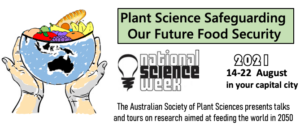
In coming weeks, look out for events posted to the “Find an Event” page on the National Science Week webpage, and also posted to ASPS’s twitter account (@asps_ozplants), which hopefully you are all following. Please be part of the action and post your events too.
Tweet to @asps_ozplants
July Phytogen will aim to provide a list of the ASPS events happening during August 2021.
Events
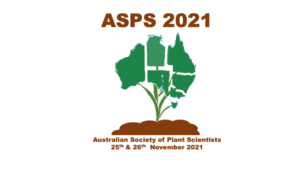
details soon………
Please login and check your ASPS membership is up to date. Encourage your colleagues and students to join ASPS.
Tweet to @asps_ozplants your news and upcoming events.
Recent Posts
Tags
Archives
- June 2025
- May 2025
- April 2025
- March 2025
- February 2025
- January 2025
- December 2024
- November 2024
- October 2024
- September 2024
- August 2024
- July 2024
- June 2024
- May 2024
- April 2024
- February 2024
- January 2024
- November 2023
- October 2023
- September 2023
- August 2023
- July 2023
- June 2023
- May 2023
- April 2023
- March 2023
- February 2023
- December 2022
- November 2022
- October 2022
- September 2022
- August 2022
- July 2022
- June 2022
- May 2022
- April 2022
- March 2022
- February 2022
- January 2022
- December 2021
- November 2021
- October 2021
- September 2021
- August 2021
- July 2021
- June 2021
- April 2021
- March 2021
- February 2021
- January 2021
- December 2020
- November 2020
- October 2020
- September 2020
- August 2020
- July 2020
- June 2020
- May 2020
- April 2020
- March 2020
- February 2020
- January 2020
- December 2019
- November 2019
- October 2019
- September 2019
- August 2019
- July 2019
- June 2019
- May 2019
- April 2019
- March 2019
- February 2019
- January 2019
- December 2018
- November 2018
- October 2018
- September 2018
- August 2018
- July 2018
- June 2018
- May 2018
- April 2018
- March 2018
- February 2018
- January 2018
- December 2017
- November 2017
- October 2017
- September 2017
- August 2017
- July 2017
- June 2017
- May 2017
- April 2017
- March 2017
- February 2017
- January 2017
- December 2016
- November 2016
- October 2016
- September 2016
- August 2016
- July 2016
- June 2016
- May 2016
- April 2016
- March 2016
- February 2016
- January 2016
- December 2015
- November 2015
- October 2015
- September 2015
- August 2015
- July 2015
- June 2015
- May 2015
- April 2015
- March 2015
- February 2015
- January 2015
- December 2014
- November 2014
- October 2014
- September 2014
- August 2014
- July 2014
- June 2014
Copyright 2017 Australian Society of Plant Scientists Disclaimer & Privacy
Website by Michael Major Media




